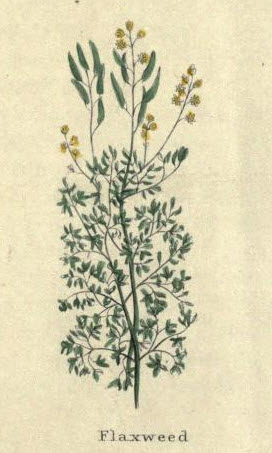
FLAX-WEED, or TOAD-FLAX.Description:
Flaxweed Antirrhinon Linarium. This weed is reckoned by some to be poisonous; yet it is very useful. Common Flax-weed has various stalks, abounding with long and narrow ash-coloured leaves, and from the middle of them almost upward, stored with a number of pale yellow flowers, of a strong unpleasant scent, with deeper yellow mouths, and blackish flat seed in round heads. The root is a little woody, and white, especially the main down right one, with many fibres, abiding many years, shooting forth roots every way round about, and new branches every year. It grows on dry banks, by the waysides, in meadows, by hedge-sides, and upon borders of fields. It flowers in Summer. See also: Flax
Herbal Remedies and Medicinal Uses of Flax Weed:The tops are used fresh gathered, or the whole herb dried. An infusion is very good against jaundice, and to remove by urine, those watery humours which cause dropsy. A decoction of both leaves and flowers, is rather purgative, and tends to the removal of obstructions of the liver. The herb distilled answers the same purpose. It is very effectual if a little Peruvian Bark, or Solution of Quinine, and a little Cinnamon, be combined with it. The juice of the herb, or the distilled water, is a good remedy for inflammation of the eyes. A fine cooling ointment is made by boiling the fresh plant chopped in lard, till it be crisp — strain, and you will have a fine green ointment good for sores, ulcers, cancers. etcetera. See also:
Important Disclaimer:
The information contained on this web site is for educational purposes
only. It is not intended to diagnose, treat, or cure any diseases. Any
information presented is not a substitute for professional medical advice
and should not take the place of any prescribed medication. Please do not
use this information to diagnose or treat a health problem or disease
without consultation with your physician.
This page and the rest of the encyclopedia of medicinal herbs was reproduced from old herbals written in the 1700 and 1800s. They are of historical interest to show the traditional uses of various herbs based on folk medicine and ancient wisdom. However the traditional uses for these herbs have not been confirmed by medical science and in some cases may actually be dangerous. Do not use the these herbs for any use, medicinal or otherwise, without first consulting a qualified doctor. Browse Herbs Alphabetically: A B C D E F G H I J K L M N O P Q R S T U V W X Y Z |
Advertisement
|
||
|
|||